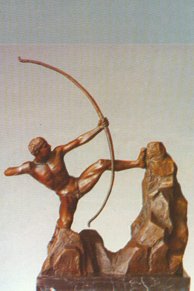Kung-fu: 1 definition
Introduction:
Kung-fu means something in Hinduism, Sanskrit. If you want to know the exact meaning, history, etymology or English translation of this term then check out the descriptions on this page. Add your comment or reference to a book if you want to contribute to this summary article.
In Hinduism
Dhanurveda (science of warfare)
Source: Knowledge Traditions & Practices of India: Martial Arts Traditions: A SurveyKung-fu refers to ancient Chinese martial art tracing its origins to India.—The Japanese and the Chinese trace the origins of their popular martial arts, karate and kung-fu, to India. Notably, according to Chinese texts and tradition, an Indian sage, Bodhidharma (5th or 6th century CE), who travelled from south India to north China and settled at the Shaolin Monastery in the Sung Mountain, meditated there for nine years and imparted some early techniques of Indian martial arts to his follower monks.

Dhanurveda (धनुर्वेद) refers to the “knowledge of warfare” and, as an upaveda, is associated with the Ṛgveda. It contains instructions on warfare, archery and ancient Indian martial arts, dating back to the 2nd-3rd millennium BCE.
See also (Relevant definitions)
Partial matches: Fu.
Relevant text
Search found 2 books and stories containing Kung-fu; (plurals include: fus). You can also click to the full overview containing English textual excerpts. Below are direct links for the most relevant articles:
Socially Engaged Buddhism (with reference to Australian society) (by Phuong Thi Thu Ngo)
Chinese Polity and Political Thought < [November-December, 1929]